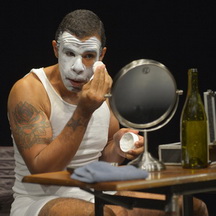Problem solving …
Measure for Measure is considered a “problem” play: that is to say, not only one that does not fall neatly into tragedy or comedy but also one in which a problem is solved. In this case, the problem of punishing human desire and the probity of mercy. It’s a play whose problems are solved indirectly, however, so that the ethics questioned are never completely addressed, and the playwright steals off like a thief down an alley, leaving us to ponder our empty wallets and how we should refill them.
UC’s Department of Theater, Dance and Performance Studies has mounted an appropriately dark version of this challenging play, with panoramas of empty stage, smoky jazz interludes, and a spare production, directed by Peter Glazer, that leaves the words and complex plot exposed and revealed on stage.
The Duke of Vienna (Will Austin, in wonderfully resonant voice) turns over his rule to his deputy Angelo (Carl Hovick-Thomas, projecting a quietly sour demeanor), while he leaves on a diplomatic mission. The severe and fastidious deputy shuts down the suburban whorehouses (the urban ones saved by the ducats of a wealthy user in our first indication that Angelo’s government is less than angelic) and, following the letter of the law, condemns to death a young gentleman, Claudio (Marc Juberg, warm voiced and desperate), for impregnating his fiancée. Claudio’s novitiate sister, Isabella (appropriately modest Reya Sehgal), comes to plead for her brother’s life. She does so rather too effectively, for the strict Angelo falls in lust with her and offers her a deal: Have sex with me, and save your brother’s life.
The moral dilemmas grow more complex. And are only solved by the timely appearance of the Duke, who overrules his surrogate’s hypocritical rule.
In these days of post-sexual freedom and, here, in relatively licentious Berkeley, the play’s central issue of sex outside the sacrament of marriage is beyond relevance, but it’s a credit to Shakespeare that we get the idea anyway: that rules of morality are flexible and imposed by quirks of personality rather than abstract and immutable justice with a capital J.
Everything’s up-to-date in Elizabethan England
In order to make this intricate and quickly spoken text relevant to a contemporary audience, the director and team chose to make subtle references to our own milieu. The costumes, by Caitlin Kagawa, use the gray flannel business suit as a base, with arms and pants legs cut in vertical slices, satin pulled through in puffs like Elizabethan garb. Isabella is dressed like a post-Vatican II nun in modest past-the-knee dress, stylishly mauve-and-white granny heels, and modified white veil.
The set, designed by Melpomeme Katkalos, is a distressed plaster wall, shadowy and monolithic, across the surface of which is occasionally projected a searing purple light. At times, however, the long panorama of the stage seemed agoraphobic, diminishing the scenes were intimacy is required.
As the few spare benches and chairs are moved between scenes, the setting, act and scene number are projected in Courier type across the entire length of the wall. Light determines the setting more than props: the barred light falling on the floor of the prison cell, the light falling through the domed window of the nunnery, the chaotically colored light of the grange. All very stylish, very contemporary, but echoing traditional Shakespearean, very well realized. The lighting was by David K. H. Elliott.
As usual the low-comedy characters steal the show: Daniel Desmarais portraying a swaggering, goofy and questionably intentioned Lucio, and Holli Dillon, a staggeringly drunk and poxy Mistress Overdone. Drew Ledbetter excelled as the bawdy and reckless whorehouse barman, Pompey, brightening up the stage and audience with his every appearance. Nicholas LoCicero had a lovely cameo as the dim executioner.
—Jaime Robles
Originally published in the Piedmont Post
